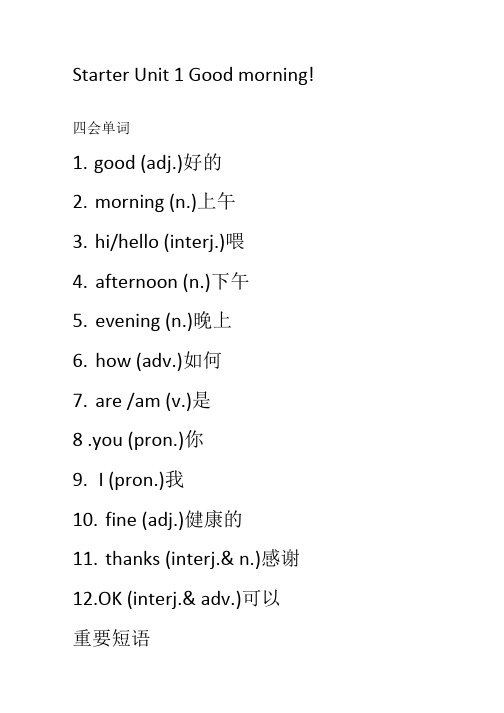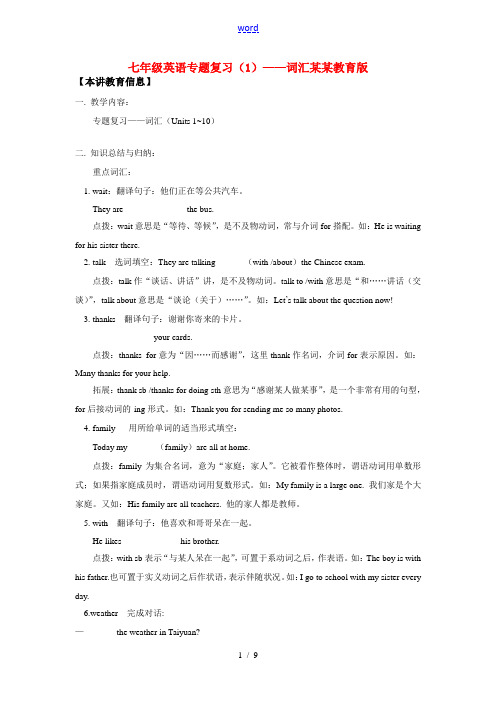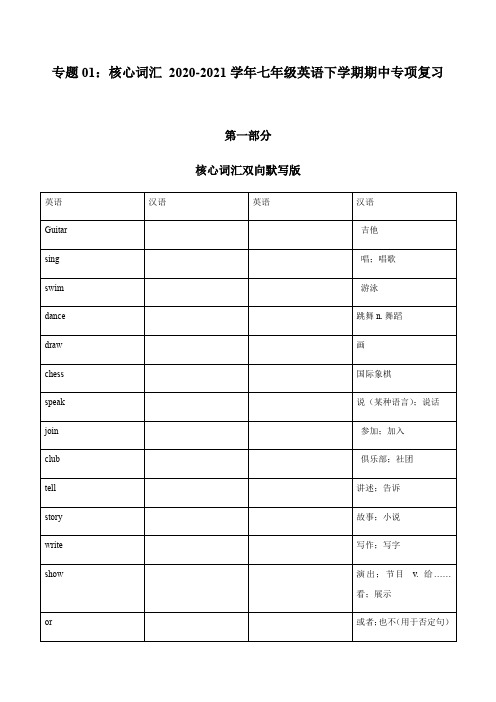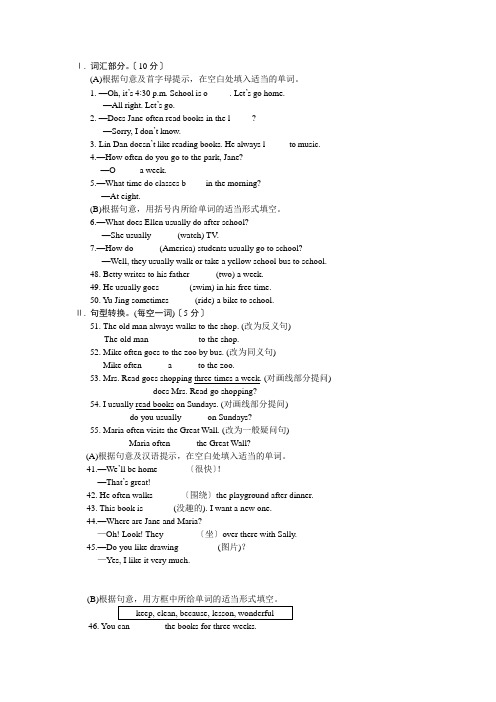七年级英语专项复习词汇部分
七年级英语复习词汇.doc

Starter Unit 1 Good morning!四会单词1.good (adj.)好的2.morning (n.)上午3.hi/hello (interj.)喂4.afternoon (n.)下午5.evening (n.)晚上6.how (adv.)如何7.are /am (v.)是8 .you (pron.)你9.I (pron.)我10.fine (adj.)健康的11.thanks (interj.& n.)感谢12.OK (interj.& adv.)可以重要短语1.boys' names男孩名字2.girls' names 女孩名字3.HB (铅笔芯)硬黑4.CD光盘5.BBC英国广播公司6.good afternoon 下午好7.good evening 晚上好核心句子1.Good morning!早上好!2.Hello/Hi, Eric!你好,艾瑞克!3.Good afternoon, Eric ! 下午好,艾瑞克!4.Good evening, Bob !晚上好,鲍勃!5.一How are you ? 一你好吗?一I'm fine, thanks. 一我很好,谢谢。
Starter Unit 2 What怎this in English?四会单词1.what (pron.& adj.)什么2.js (v.)是3.this (pron.)这个4.English (n.)英语5.map (n.)地图6.cup (n.) 杯子7.ruler (n.) 尺子8.pen (n.)钢笔9.orange (n.)橙子10.jacket (n.)夹克衫11.key (n.)钥匙12.that (pron.)那个13.spell (v.)拼写14.please (interj.) 请重要短语l.in English 用英语2. a jacket 件夹克衫3.an orange 一个橙子4.a ruler 把尺5. a map 张地图核核心句子1.一What怎this in English?—这个用英语怎么说?一It7 s a jacket.—它是一件夹克衫。
期末专项复习——词汇、句型与语法(含答案)2020-2021学年人教版英语七年级下册

七年级下册英语期末专项复习——词汇、句型与语法一、根据句意及汉语或首字母提示写出单词。
1. They are good (音乐家).2. The man works at a TV s .3. Miss Wang t us English.4. Don't be (害怕). We can help you.5. Tom goes to school by (地铁).6. He can (写) some English words.7.The boy can speak (俄语).8.How’s the (天气) in Heilongjiang in summer?9.My math teacher is (严格的) with me.10. The meeting is very (重要的).11.Please (记住),all students have to follow the school rules.12.We must wash our hands b dinner.13.We (练习) speaking English in the classroom.14.The (餐馆) is near the school.15.The (医院)is not far from here.16.How do you (描述) your English teacher?17.E of us has an English book.18. I will (花费) five days staying with my aunt.19.Bill u gets home at 6:00, but today he didn't get home until 7: 00.20.We must f the school rules.21.English and Chinese are useful l in the world.22. About 200,000 (游客)came to the old town last year.23.I got a big s________ (惊讶) when I saw so many books on the floor.24.Mr. Brown made an e________(极好的) lunch for us and all of us liked it so much.25.Teachers' day is coming. I want to buy a (特别的) gift for my Chinese teacher.二、用所给词的适当形式填空。
初中674个核心单词

初中674个核心单词一、七年级上册(部分)1. book[bʊk] n.(名词)- 例句:I have a book.(我有一本书。
)2. pen[pen] n.- 例句:This is my pen.(这是我的钢笔。
)3. pencil['pensl] n.- 例句:His pencil is blue.(他的铅笔是蓝色的。
)4. ruler['ruːlə(r)] n.- 例句:Use your ruler to draw a straight line.(用你的尺子画一条直线。
)5. eraser[ɪ'reɪzə(r)] n.- 例句:I need an eraser to correct my mistake.(我需要一块橡皮来改正我的错误。
)二、七年级下册(部分)1. guitar[gɪ'tɑː(r)] n.- 例句:He can play the guitar very well.(他吉他弹得非常好。
)2. swim[swɪm] v.(动词)- 例句:I like to swim in summer.(我喜欢在夏天游泳。
)3. dance[dɑːns] v. & n.- 例句:She can dance beautifully.(她跳舞跳得很美。
)- 例句:There will be a dance party tonight.(今晚将有一个舞会。
)4. draw[drɔː] v.- 例句:Can you draw a picture for me?(你能为我画一幅画吗?)5. speak[spiːk] v.- 例句:He can speak English fluently.(他能流利地说英语。
)三、八年级上册(部分)1. newspaper['njuːzpeɪpə(r)] n.- 例句:My father reads a newspaper every morning.(我爸爸每天早上读报纸。
七年级重点英语单词必背

七年级重点英语单词必背七年级是学生初步接触英语的阶段,掌握一些重点的英语单词对于建立英语基础非常关键。
下面我将介绍一些七年级英语中的重点单词,帮助学生们更好地掌握这些词汇。
1. Hello(你好)- 这是最基本的英语问候语,表示向别人打招呼或问好的方式。
例句:Hello, how are you?(你好,你好吗?)2. Name(名字)- 表示个人的命名。
例句:My name is Emily.(我的名字是Emily.)3. School(学校)- 指代学生和老师学习的地方。
例句:I go to school every day.(我每天去上学。
)4. Teacher(老师)- 教授学生知识的人。
例句:Mr. Smith is my English teacher.(Smith先生是我的英语老师。
)5. Student(学生)- 在学校接受教育的人。
例句:There are many students in the classroom.(教室里有很多学生。
)6. Book(书)- 纸质的出版物,用来阅读和学习。
例句:I like reading books in my free time.(我喜欢在闲暇时间读书。
)7. Desk(书桌)- 供学生使用的平面家具。
例句:Please put your books on the desk.(请把你的书放在书桌上。
)8. Chair(椅子)- 供人坐的一种家具。
例句:Can I sit on this chair?(我可以坐在这把椅子上吗?)9. Bag(书包)- 用来携带书籍和其他物品的容器。
例句:Don't forget to bring your bag to school.(别忘了带书包去学校。
)10. Eleven(十一)- 数字11。
例句:Today is the eleventh day of the month.(今天是这个月的第11天。
七年级英语专题复习(1)——词汇鲁教版

七年级英语专题复习(1)——词汇某某教育版【本讲教育信息】一. 教学内容:专题复习——词汇(Units 1~10)二. 知识总结与归纳:重点词汇:1. wait:翻译句子:他们正在等公共汽车。
They are ______ _______ the bus.点拨:wait意思是“等待、等候”,是不及物动词,常与介词for搭配。
如:He is waiting for his sister there.2. talk 选词填空:They are talking ______(with /about)the Chinese exam.点拨:talk作“谈话、讲话”讲,是不及物动词。
talk to /with意思是“和……讲话(交谈)”,talk about意思是“谈论(关于)……”。
如:Let’s talk about the question now!3. thanks 翻译句子:谢谢你寄来的卡片。
______ _______ your cards.点拨:thanks for意为“因……而感谢”,这里thank作名词,介词for表示原因。
如:Many thanks for your help.拓展:thank sb /thanks for doing sth意思为“感谢某人做某事”,是一个非常有用的句型,for后接动词的-ing形式。
如:Thank you for sending me so many photos.4. family 用所给单词的适当形式填空:Today my ______(family)are all at home.点拨:family为集合名词,意为“家庭;家人”。
它被看作整体时,谓语动词用单数形式;如果指家庭成员时,谓语动词用复数形式。
如:My family is a large one. 我们家是个大家庭。
又如:His family are all teachers. 他的家人都是教师。
专题01:核心词汇2020-2021学年七年级英语下学期期中专项复习

专题01:核心词汇2020-2021学年七年级英语下学期期中专项复习第一部分核心词汇双向默写版第二部分核心词汇专项训练一、根据中/英文提示填空1.They are waiting for you at the bus ______ (车站).【答案】station【详解】句意:他们正在公交车站等你。
“车站”译为station,此处是特指的一个公交车站,用单数即可。
故填station。
2.My parents get some ______ (锻炼)in a park near my home.【答案】exercise【详解】句意:我父母在我家附近的公园里锻炼身体。
exercise“锻炼”,是一个不可数名词,故用原形,故填exercise。
3.It’s ______(重要的)to eat well and stay healthy.【答案】important【详解】句意:吃得好,保持健康很重要。
“重要的”译为important,形容词在句中作表语。
故填important。
4.There are some ______ (叶子)on the ground when autumn comes.【答案】leaves【详解】句意:秋天来临时,地上有一些树叶。
leaf“树叶”,是可数名词,空格前有some修饰,名词应用复数形式,故填leaves。
5.We have many ________ (节日) in China, such as National Day and Children’s Day.【答案】festivals【详解】句意:在中国我们有许多节日,如国庆节和儿童节。
根据中文提示,festival“节日”,可数名词,many修饰可数名词的复数形式,故填festivals。
6.My uncle is an ________(演员)at the theater.【答案】actor【详解】句意:我叔叔是剧院的演员。
仁爱七年级下册英语词汇部分复习题

Ⅰ. 词汇部分。
〔10分〕(A)根据句意及首字母提示,在空白处填入适当的单词。
1. —Oh, it’s 4:30 p.m. School is o_____. Let’s go home.—All right. Let’s go.2. —Does Jane often read books in the l_____?—Sorry, I don’t know.3. Lin Dan doesn’t like reading books. He always l_____ to music.4.—How often do you go to the park, Jane?—O_____ a week.5.—What time do classes b____ in the morning?—At eight.(B)根据句意,用括号内所给单词的适当形式填空。
6.—What does Ellen usually do after school?—She usually _____ (watch) TV.7.—How do _____ (America) students usually go to school?—Well, they usually walk or take a yellow school bus to school.48. Betty writes to his father _____ (two) a week.49. He usually goes ______ (swim) in his free time.50. Yu Jing sometimes _____ (ride) a bike to school.Ⅱ. 句型转换。
(每空一词)〔5分〕51. The old man always walks to the shop. (改为反义句)The old man _____ _____ to the shop.52. Mike often goes to the zoo by bus. (改为同义句)Mike often _____ a _____ to the zoo.53. Mrs. Read goes shopping three times a week. (对画线部分提问)_____ _____ does Mrs. Read go shopping?54. I usually read books on Sundays. (对画线部分提问)_____ do you usually _____ on Sundays?55. Maria often visits the Great Wall. (改为一般疑问句)_____ Maria often _____ the Great Wall?(A)根据句意及汉语提示,在空白处填入适当的单词。
初一七年级上册英语必考单词

初一七年级上册英语必考单词一、Starter Unit 1 - 3。
1. good /gud/ adj.(形容词):好的。
2. morning /'mɔ:niŋ/ n.(名词):早晨;上午。
3. hi /hai/ interj.(感叹词):嗨;喂。
4. hello /hə'ləu/ interj.(感叹词):你好;喂。
5. afternoon /ˌɑ:ftə'nu:n/ n.(名词):下午。
6. evening /'i:vniŋ/ n.(名词):晚上;傍晚。
7. how /hau/ adv.(副词):怎样;如何。
8. are /ɑ:(r)/ v.(动词):是。
9. you /ju:/ pron.(代词):你;你们。
10. I /ai/ pron.(代词):我。
11. am /æm/ v.(动词):是。
12. fine /fain/ adj.(形容词):健康的;美好的。
13. thanks /θæŋks/ n.(名词):感谢;谢谢。
14. OK /əu'kei/ interj. & adj.(感叹词和形容词):好;可以。
15. what /wɔt/ pron. & adj.(代词和形容词):什么?16. is /iz/ v.(动词):是。
17. this /ðis/ pron.(代词):这;这个。
18. in /in/ prep.(介词):(表示使用语言、材料等)用;以。
19. English /'iŋgliʃ/ n. & adj.(名词和形容词):英语;英格兰的;英语的。
20. map /mæp/ n.(名词):地图。
21. cup /kʌp/ n.(名词):杯子。
22. ruler /'ru:lə/ n.(名词):尺;直尺。
23. pen /pen/ n.(名词):笔;钢笔。
- 1、下载文档前请自行甄别文档内容的完整性,平台不提供额外的编辑、内容补充、找答案等附加服务。
- 2、"仅部分预览"的文档,不可在线预览部分如存在完整性等问题,可反馈申请退款(可完整预览的文档不适用该条件!)。
- 3、如文档侵犯您的权益,请联系客服反馈,我们会尽快为您处理(人工客服工作时间:9:00-18:30)。
七年级英语专项复习词汇部分一:名词(可数名词,不可数名词,名词所有格---见课本94至95页)1.I want some______(apple) and______ (chicken)for lunch.2.Look,many______ (bus) are there.3.Where are the______ (tomato)?4.Here are two______ (photo)5.Do you like______ (comedy)?6.What’s (______Lisa) favorite sport?7.The______ (students) books are on the desk.8. ______ (Ann and Bob) father is a teacher.二:冠词(用冠词a,an,the填空,不需填用“∕”表示)1.In______morning you can see ______sun is very red.2.I like playing______chess,but Jack likes playing ______piano.3.There is______ “u”and ______ “s”in the word “see”.4.Look!There is____ old map on____wall(墙壁).5.This is____ pear.It’s not ____orange.6.We have ____basketball. ____basketball is forty yuan.三:代词(形容词性物主代词,人称代词的主格和宾格,指示代词---见课本95至96页)1.---Where’s____ (my/I ) book?--- ____ (Its/It) is on the sofa.2.____ (These/This) are my cousins.I love____ (they/them).3.____ (We/Us) help____ (he/him) with history.4.---Is____ (those/that) your sister?---No, ____ (it/she) isn’t.5.Can you go to school with____ (I/me)?6.She is an American girl. ____ (Her/His) name is Jenny.四:数词(基数词和序数词)1.Tom is ____years old.Today is his____ birthday.(fourteen/fourteenth)2.January is the____ month of the year.(one/first)3.We have a speech contest on May______ (twentieth—second/twenty—second). 五:连词(用and ,or,but,because,so填空,可重复使用)1.They can sing____dance at the party.2.He is very poor(贫穷),____he is very happy.3.---Can you swim____ paint?---I can swim.4.I have a pen a pencil, ____ I don’t have a ruler____an eraser.5.Tom likes action movies, ____they’re interesting.6.I am ill(生病),____I don’t go to school today.六:介词(用at ,in ,on,for,before,after,of,to,under填空,可重复使用)1.We go home ____five o’clock____the afternoon.2.They have music____Monday.2.Our school day is____August third.3.We sell sweaters____red ,white and green____$ 16.4.Frank often eats hamburgers____breakfast.5.---Are my socks on the bed?---No,they are____the bed.6.This is a picture____my family.7.Let’s go____a movie.8.Lily ususlly watches TV____going to bed.9.You can’t run____dinner.七:动词(用所给动词的适当形式填空)1.--- ____ you____ (play) soccer after class?---Yes,I do.2.I uaually____ (go) to work at 8:30a.m..3.---When____he____ (do) homework?---He ____(do)homework at 5:00p.m..4.She often ____ (get) up at 6:00,then she ____ (brush) her teeth and ____ (have) breakfast.At around 7:40,she____ (go) to school.5.---What does Alice do on weekends?---She____ (study) Chinese and math at home.6.---Who____(be)that boy?---He____ (be) my friend.7.My favorite color____ (be) black.Jeff”s favorite colors____ (be) yellow and red.8.I think Beijing Opera____ (be) boring and thriller____s(be)scary.9.I____ (be) a student in Jiebei Middle School(碣北中学)。
10.Ken really loves____ (listen) to music.11.They want____ (buy) some clothes.12.Let’s____ (watch) a volleyball game.八、句型转换部分,每空一词(A指“改为一般疑问句”,B指“改为否定句”,C指“对划线部分提问”,D指“同义句”,E指“改为单数句”,F指“改为复数句”)1.My name is Jack Smith.A:肯定回答:否定回答:B:C:D:2.I’m OK.A:B:C:D:3.Her books are on the chair.A:B:C:归纳:1.含有be 动词(am ,is,are)的肯定句:主语+ be+其它词. (注意:主语可以是名词或人称代词的主格)2.改为一般疑问句:Be+主语+其它词?只需把am,is,are调到开头(am改为are,I改为you,my和our改为your),注意肯定回答中主语与be动词不能缩写。
3.改为否定句:主语+be+ not+其它词.只需在am ,is,are后面加上not。
amnot不能缩写,is not可以缩写为isn’t,are not可以缩写为aren’t。
4.改为特殊疑问句(即对划线部分提问):疑问词(或词组)+be+主语(+其它词)?已学过的疑问词:what ,who, when, where, how ,why4.I can speak English.A:肯定回答:否定回答:B:C:归纳:1.含有情态动词can+动词原形的肯定句:主语+ can+动词原形(+其它词).2.改为一般疑问句:Can+主语+动词原形(+其它词)?只需把can调到开头,其它的不变.(主语I ,we通常改为you)3.改为否定句:主语+can+ not+动词原形(+其它词).只需在can后面加not。
can not 可以缩写为can’t。
4.改为特殊疑问句:疑问词+can+主语+动词原形(+其它词)?注意:can 是固定不变的,不会因为主语的变而改变。
5.We go to school at 8:00.A:肯定回答:否定回答:B:C:6.Liu Ping usually eats lunch at 12:00.A:肯定回答: 否定回答:B:C:归纳:1.含有实义动词(如go,play,like…)的肯定句:a:主语(不是第三人称单数)+动词原形(+其它词).b:主语(第三人称单数)+动词第三人称单数(+其它词).注意:1.主语第三人单数是指:he/she/it/可数名词单数形式(如Jim,my brother)/不可数名词(如China)。
2.动词第三人称单数形式的变化见课本98页。
2.改为一般疑问句:Do/Does+主语+动词原形(+其它词)?a:当主语不是第三人称单数时,在主语前面加do ,其它不变。
b:当主语是第三人称单数时,在主语前面加does,主语后面的动词由第三人称改为原形。
3.改为否定句:主语+don’t/doesn’t+动词原形(+其它词).a:当主语不是第三人称单数时,在主语后面加don’t,其它不变。
b:当主语是第三人称单数时,在主语后面加doesn’t,原来的动词第三人称单数改为原形。
4.改为特殊疑问句:疑问词+do/does+主语+动词原形(+其它词)?注意:助动词用do还是does由主语的形式决定。
主语是第三人称单数时用does。
主语不是第三人称单数时,用do。
7.His favorite subject is math.C:8.Our cars are white.C:E:9.This is an English dictionary.C:F:10.She is my aunt.C:F:11.It’s seven thirty.C:D:12.His brother’s birthday is on June second.C:D:13.We are thirteen years old.C:14.The shoes are fifteen dollars.C:15.I eat two eggs every day.C:16.He likes art,because it’s fun.C:I. 根据句意和首字母提示每空填一个单词,使句意完整。
